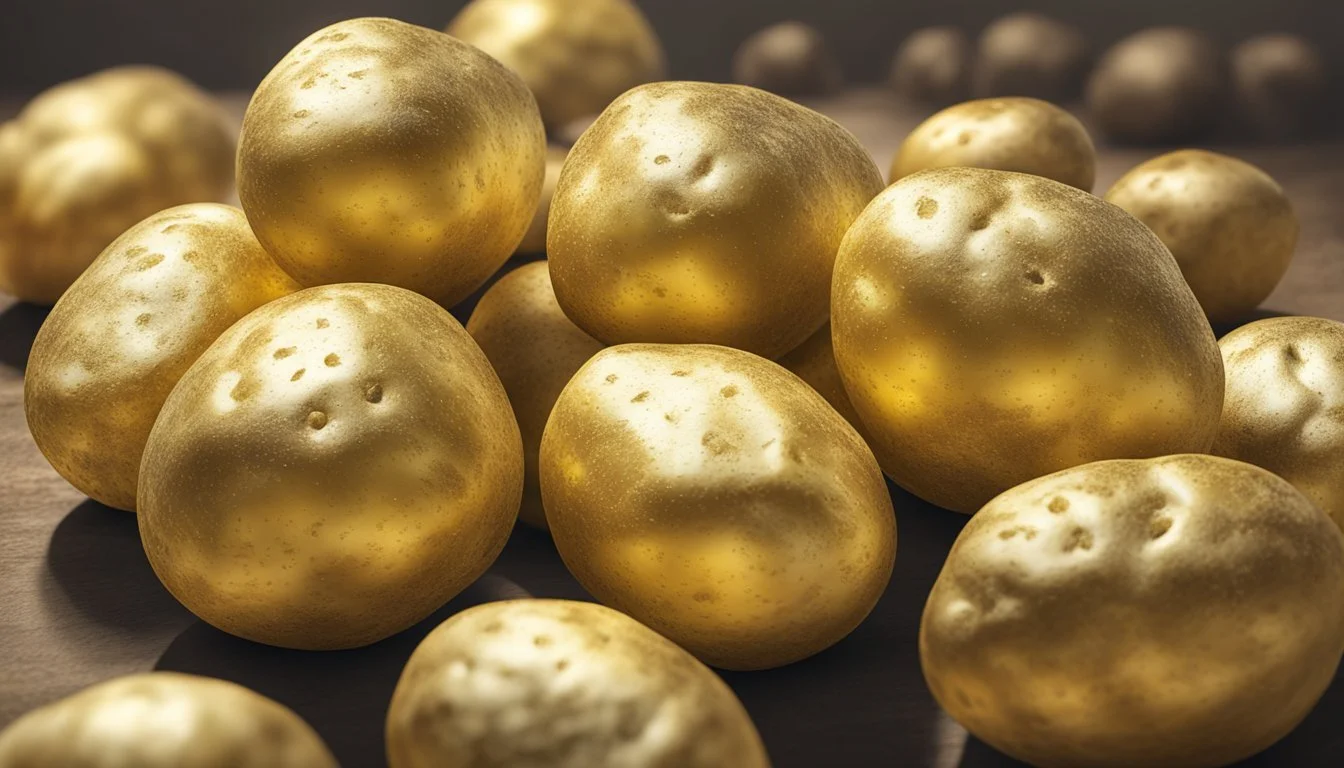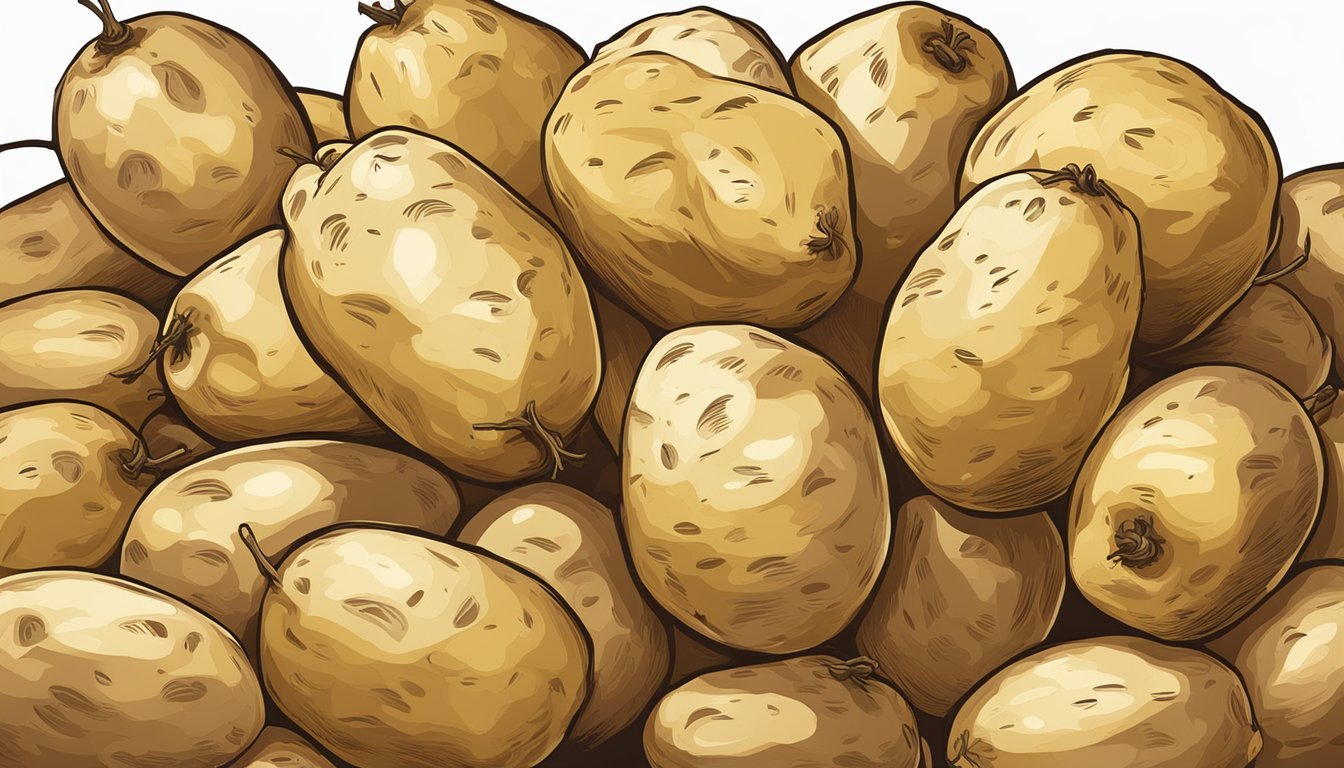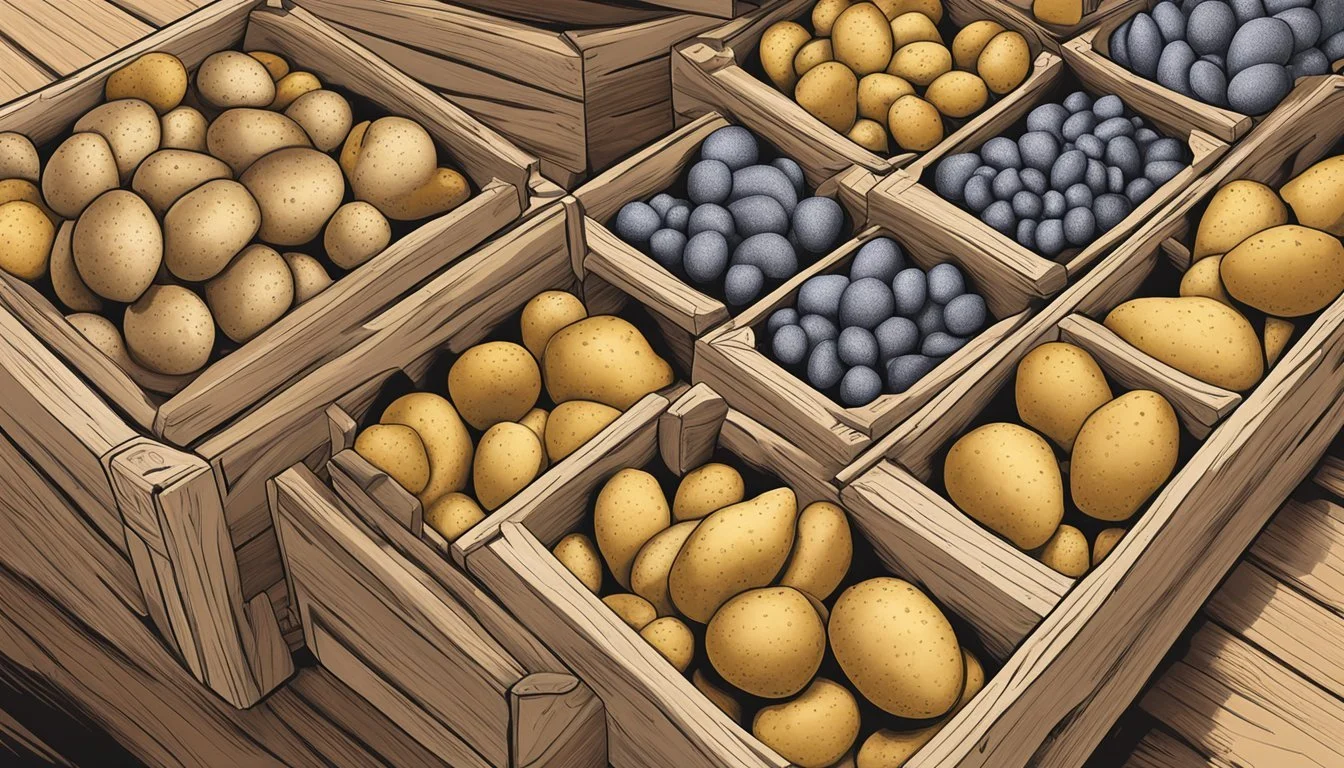Yukon Gold Potatoes Substitutes
Best Alternatives for Cooking
Yukon Gold potatoes are cherished for their creamy texture, buttery flavor, and versatility in the kitchen. They are ideal for roasting, mashing, and even making soups. For those moments when Yukon Gold potatoes are unavailable, several substitutes can deliver similar results and maintain the quality of your dishes.
Carola potatoes are among the top alternatives, offering a comparable firm and creamy texture with a classic buttery and earthy taste. Red Bliss potatoes, with their mild, slightly sweet flavor, and firm, waxy texture, also serve as great replacements in most potato dishes. Russet potatoes, though starchier, can step in for roasted or baked preparations due to their earthy taste.
Dutch Cream potatoes, loved for their creamy texture and rich flavor, can be used in just about any recipe where Yukon Golds would shine. Other substitutes such as Fingerling, Inca Gold, Katahdin, and Maris Piper potatoes further expand your options, ensuring that your meals remain flavorful and satisfying even without Yukon Golds.
Profile of Yukon Gold Potatoes
Yukon Gold potatoes are a versatile yellow-fleshed potato known for their medium starch content, smooth texture, and ability to enhance a variety of dishes from mashed potatoes to casseroles. These potatoes provide nutritional benefits while offering a unique flavor profile suitable for numerous culinary applications.
Nutritional Value
Yukon Gold potatoes are a nutritious option for many diets. Rich in Vitamin C, they support immune function and skin health. A medium-sized potato contains approximately 45% of the daily recommended intake of Vitamin C.
Additionally, Yukon Gold potatoes are a good source of potassium, aiding in muscle function and blood pressure regulation. Each potato provides around 20% of the daily value.
Fiber content is another highlight, contributing to digestive health. With moderate fiber levels, they help in maintaining regular bowel movements. These potatoes also offer notable amounts of Vitamin B6 and iron, making them a well-rounded choice for nutritional needs.
Culinary Uses
Yukon Gold potatoes are highly versatile in the kitchen. Their creamy texture and buttery flavor make them ideal for mashed potatoes, providing a smooth and rich consistency. They excel in soups and potato salad due to their ability to hold their shape when cooked.
When roasted, Yukon Golds develop a crisp exterior while maintaining a tender interior. They are also suitable for baking and grilling, offering a delightful texture and enhanced flavors. Casseroles benefit from their consistent performance, and they can be used effectively in various cooking methods to suit different recipes.
Texture and Flavor Characteristics
Yukon Gold potatoes are characterized by their medium starch content, giving them a unique texture that is neither too waxy nor too starchy. This balance allows them to be used in a wide range of dishes without falling apart or becoming overly mushy.
The flavor of Yukon Gold potatoes is distinctively earthy and buttery, with a hint of sweetness. This makes them a favored ingredient in recipes requiring a rich taste. The yellow-fleshed interior adds a visual appeal, making dishes look as good as they taste.
Their ability to blend well with other flavors and retain texture under various cooking methods makes them indispensable in the kitchen.
Common Substitutes and Their Features
Various potato varieties can stand in for Yukon Gold potatoes, each suited to different types of dishes based on their texture and flavor profiles. These alternatives can be matched to your specific culinary needs, from baking to boiling.
Substitutes for Baking and Roasting
Russet Potatoes: Known for their high starch content and mild, earthy flavor, Russet potatoes are excellent for baking and roasting. Their dry, fluffy texture allows them to crisp up beautifully in the oven.
Red Bliss Potatoes: With a firm, waxy texture and slightly sweet flavor, Red Bliss potatoes are ideal for roasted potatoes. They hold their shape well when cooked and offer a delightful contrast between a crispy exterior and a creamy interior.
Carola Potatoes: Carola potatoes have yellow skin and flesh, similar to Yukon Gold. Their firm and creamy texture is perfect for baking and roasting, providing a buttery taste with a hint of earthiness.
Substitutes for Boiling and Potato Salads
Red Bliss Potatoes: Their firm and waxy texture makes them a top choice for boiling and potato salads. They maintain their shape after cooking, ensuring a pleasing, consistent texture.
Fingerling Potatoes: These small, elongated potatoes boil well and add an interesting shape and color to salads. Their waxy texture helps them stay intact, contributing to a hearty, consistent bite.
Yellow Finn Potatoes: With a slightly buttery flavor and yellow flesh, Yellow Finn potatoes are fantastic for boiling. Their texture holds up well in salads, providing a rich and creamy bite without falling apart.
Substitutes for Mashed Potatoes
Dutch Cream Potatoes: Renowned for their creamy texture and buttery flavor, Dutch Cream potatoes result in exceptionally smooth and rich mashed potatoes. They mash easily and absorb flavors well.
Inca Gold Potatoes: These potatoes offer a dense, buttery texture that translates into thick and creamy mashed potatoes. Inca Golds are easy to mash and provide a luxurious mouthfeel.
Maris Piper Potatoes: Popular in the UK, Maris Piper potatoes have a high starch content, making them excellent for fluffy, smooth mashed potatoes. They absorb plenty of milk and butter, enhancing their richness.
Substitutes for Casseroles and Gratins
Katahdin Potatoes: Katahdin potatoes are versatile with a firm texture that holds well under prolonged cooking. They are excellent for casseroles and gratins, retaining their structure while blending flavors seamlessly.
Idaho Potatoes: Similar to Russets, Idaho potatoes work well in casseroles and gratins due to their high starch content. They help create a creamy, cohesive texture essential for these dishes.
Carola Potatoes: Their firm, creamy texture makes Carola potatoes suitable for gratins. They pair well with cheese and cream, providing a luscious, well-structured dish.
Specific Use-Case Substitutions
Selecting the right potato is essential for achieving the desired texture and flavor in various dishes. Depending on the use-case, different potato varieties can effectively substitute Yukon Gold potatoes.
Making French Fries
Russet Potatoes are an excellent choice for making French fries due to their high starch content and low moisture. They fry up crispy on the outside and fluffy on the inside.
Carola Potatoes also work well, offering a slightly waxier texture but still providing a satisfying fry. They provide a balance between crispness and a creamy interior.
Purple Potatoes can add a unique visual twist to the classic French fry. Although they have a slightly firmer texture, their vibrant color makes them an interesting option. Generally, it's best to peel and slice them uniformly to ensure even cooking.
For Soups and Stews
Red Bliss Potatoes have a firm texture that holds up well in long-cooked dishes like soups and stews. Their slightly sweet and nutty flavor enhances the overall taste without becoming mushy.
Katahdin Potatoes are another suitable alternative. They are particularly good for soups and stews because they tend to retain their shape well during prolonged cooking.
Fingerling Potatoes offer a distinctive appearance and a buttery taste. They keep their form very well, making them an optimal choice for chunky stews.
When whole potatoes are used, Dutch Cream Potatoes provide a creamy consistency once cooked, contributing to the soup's richness without falling apart. Also, they add a smooth texture to the liquid.
Choosing the Right Potato Substitute
Selecting the ideal substitute for Yukon Gold potatoes involves evaluating several key factors. These include the potato's texture, flavor profile, and suitability for various cooking methods.
Factors to Consider
Texture: Texture is critical when substituting Yukon Gold potatoes. They have a unique balance between waxy and starchy qualities. Substitutes must provide similar versatility. Carola potatoes and Dutch Cream potatoes are excellent choices due to their creamy texture.
Cooking Methods: Different substitutes excel with specific cooking methods. Russet potatoes are great for baking and frying because of their high starch content. For roasting and boiling, Red Bliss potatoes and Yukon Gems can be fantastic options because of their firm, waxy texture.
Taste and Texture Comparisons
Flavors: Taste is another essential factor. Yukon Golds have a buttery flavor. Dutch Cream and Carola potatoes have similar creamy, buttery flavors. Red Bliss potatoes offer a slightly sweet and nutty taste, adding a unique twist to dishes.
Potato Type Texture Flavor Best Cooking Methods Carola Creamy, waxy Buttery Mashing, boiling, roasting Russet Starchy Earthy Baking, frying Red Bliss Firm, waxy Sweet, nutty Roasting, boiling Yukon Gems Similar to Yukon Gold, slightly smaller Creamy, slightly sweet Roasting, boiling, mashing
Finding the perfect substitute involves paying close attention to these aspects. These comparisons ensure the chosen substitute matches the original's qualities in your recipes.
Potato Selection and Storage Tips
Proper selection and storage of potatoes ensure their quality and longevity. This section outlines key points on choosing the best potatoes and maintaining them effectively.
Selecting Potatoes
When selecting potatoes, firmness is crucial. Opt for potatoes that feel firm and dense, without any soft spots or blemishes. Consistency in skin color indicates freshness; avoid any with green patches as they can be toxic.
Variety matters too. For substitutes such as Russet, Red Bliss, or Carola potatoes, ensure they meet your recipe’s needs. Russets are starchy and excellent for baking. Red Bliss offers a waxy texture, perfect for salads. Carolas resemble Yukon Gold in versatility and texture.
Check for any sprouts, which signal overripeness. Look for smooth skin to ensure they are freshly harvested.
Storage Practices
Proper storage significantly extends potato shelf life. Store potatoes in a cool, dark, and well-ventilated place. Ideal temperatures range from 45°F to 50°F. Avoid refrigerating as it converts potato starch into sugar, altering taste and texture.
Use breathable containers like paper or burlap bags to prevent moisture buildup. High humidity can lead to rot, so maintaining a dry environment is essential.
Keep potatoes away from onions, which release gases accelerating spoilage. Inspect stored potatoes regularly and promptly remove any that show signs of rot or sprouting.
By following these practices, potatoes retain their quality, ensuring the best results for any recipe.





